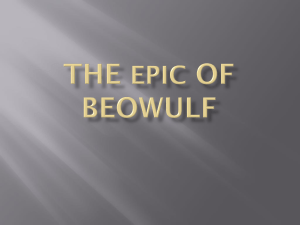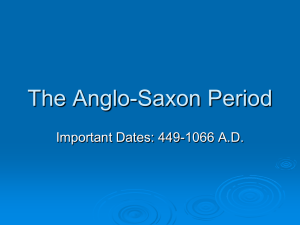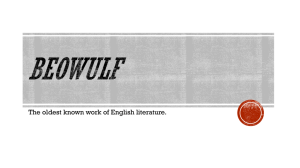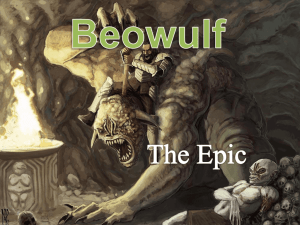Beowulf - Images
advertisement
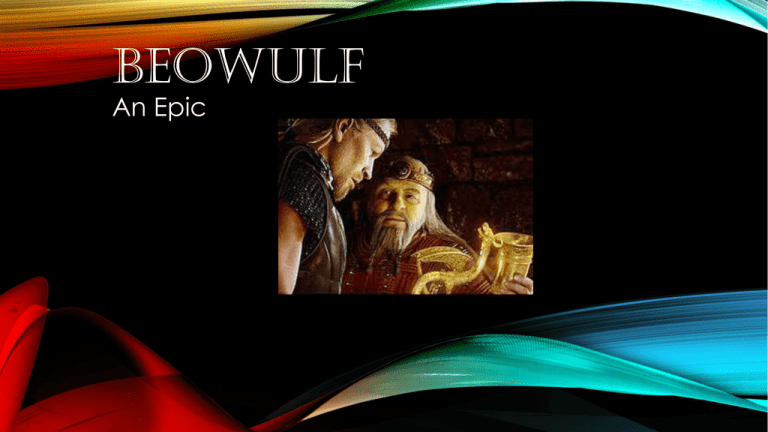
BEOWULF An Epic WHAT IS AN EPIC An epic is a long narrative poem that celebrates a hero’s deeds. They came into existence as spoken words and were retold by poet after poet from one generation to the next. Most epics date back to preliterate periods, before cultures that produced them had developed written languages. Many epics are based in historical fact, so that their public performance by poets, known as scops or bards, provided both entertainment and education for the audience. CHARACTERISTICS OF AN EPIC The hero, generally a male, is of noble birth or high position, and often of great historical or legendary importance. The hero’s character traits reflect important ideals of his society. The hero performs courageous sometimes even superhuman deeds that reflect the values of the era. The actions of the hero often determine the fate of a nation or group of people. The setting is vast in scope, often involving more than one nation. The poet uses formal diction and a serious tone. Major characters often deliver long, formal speeches. CHARACTERISTICS OF AN EPIC CONTINUED The plot is complicated by supernatural beings or events and may involve a long and dangerous journey through foreign lands. The poem reflects timeless values, such as courage and honor. The poem treats universal themes, such as good and evil or life and death. EPITHETS AND KENNINGS Epithets are adjectives that point out special traits of particular persons or things. For example in Beowulf you will see the words “strong minded” Kennings are poetic synonyms found in Germanic poems, such as Beowulf. Rather than being an adjective, like an epithet, a kenning is a descriptive phrase or compound word that substitutes for a noun. For example “the Almighty’s enemy” and “ sin-stained demon” are two kennings that are used in place of Grendel’s name. ALLITERATION Alliteration is the repetition of consonant sounds at the beginning of words. Alliteration is used to emphasize particular words or images, heighten moods, or create musical effects. Alliteration in the oral tradition was also used to aid memorization. Example from the text, “The ancient blade broke, bit into The monster’s skin, drew blood…” ALLITERATION…ALLITERATION….ALLITERATION EXAMPLE: THE ANCIENT BLADE BROKE, BIT INTO THE MONSTER’S SKIN, DREW BLOOD… Example of alliteration Line number Page number CONNECT TO YOUR LIFE Think about people in today’s world that you consider heroic, then create a cluster diagram like the one shown and jot down all of the qualities that make these people heroes in your eyes. Use your ideas to formulate your own definition of hero. Hero READ PAGES 33 – 44 AND DO THE FOLLOWING QUESTIONS THINKING THROUGH THE LITERATURE COMPREHENSION CHECK 1. What characteristics does Grendel have that make him particularly terrifying to the Danes? 2. What impressions of Beowulf do you have after reading this part of the poem? 3. What do you think causes Grendel to attack human beings? his relatives Think about : his actions and attitudes the Danish warrior’s reactions to him 4. Why do you think Beowulf offers to help a tribe other than his own, in spite of the danger. READ PAGES 45 -51 THINKING THROUGH THE LITERATURE COMPREHENSION CHECK 1. What heroic action does Beowulf perform in this part of the poem? 2. Do you think you would have enjoyed living among the Danes of Beowulf’s day? Why or why not? 3. What qualities does Beowulf display in this second battle? think about: the description of Grendel’s mother and her actions the details describing her lair Beowulf’s motives and actions 4. Are Beowulf’s words and deeds those of a traditional epic hero? support your opinion with evidence from the poem. 5. Does the behavior of Grendel’s mother seem as wicked or unreasonable as Grendel’s behavior? Explain your answer. A WARRIOR’S LETTER Imagine that you are one of Hrothgar’s warriors. Write a letter to a comrade, in which you describe Grendel, his nightly visits, and your fears about what might happen. READ PAGES 52 – 60 THINKING THROUGH THE LITERATURE COMPREHENSION CHECK From your textbook answer all questions on page 63 (1-6) 1. What do you think? How do you think you would have reacted to Beowulf’s death if you had been one of his subjects? 2. How would you describe Wiglaf’s charcter traits? 3. Beowulf is able to defeat evil in the form of Grendel and Grendel’s mother, yet he loses his life. What theme does this suggest about the struggle between good and evil? 4. In your opinion, what view of youth and old age does Beowulf convey? In answering, consider not only the details in the last part of the poem but also the earlier portrayals of Beowulf and Hrothgar. 5. On the basis of your reading of Beowulf, what qualities or values do you think the Anglo-Saxons admired? Beowulf’s reputation, position, and wealth Beowulf’s behavior before and during his battles the behavior of other characters QUESTIONS CONTINUED Active Reading/Making Judgements 6. According to the evidence that you found, how well does Beowulf conform to the characteristics of a typical epic? WHAT DO YOU THINK? 1. What is the major theme or themes that you have found in Beowulf? 2. What character traits do you think Beowulf demonstrates, that were most important to the society in which the epic was composed? Comparison Essay… In an essay, compare and contrast Beowulf with a hero from popular culture, such as Indiana Jones, Batman, or Luke Skywalker. What makes each character heroic? Organize your ideas in a Venn Diagram like the one shown here.


